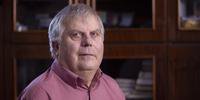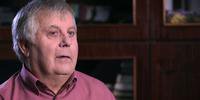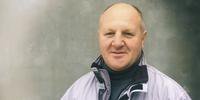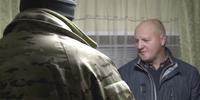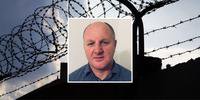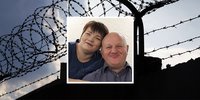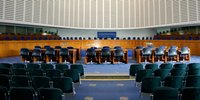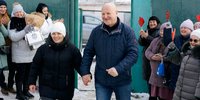The Case of Filatov in Dzhankoy
Filter
- #
Operatives receive information from former members of the Jehovah's Witnesses community that Sergey Filatov was once one of the founders of the Local Religious Organization (LRO) of Jehovah's Witnesses "Sivash" and continues to be an active believer. The organization itself was closed after the decision of the Supreme Court to recognize 396 organizations of believers as extremist, after which it did not carry out activities. The security forces put Sergey under surveillance and found out that he did not stop believing in God, and continued to gather with his fellow believers. Despite the fact that the courts' decision should not have violated the right of citizens to be Jehovah's Witnesses, law enforcement officers are beginning to prepare the basis for criminal prosecution.
- #
At Sergey Filatov's home, a meeting of friends and acquaintances takes place, where they discuss spiritual topics and thoughts from the Holy Scriptures, as well as sing religious songs. At this moment, a secret audio recording is being conducted, organized by Vladislav Sradetsky, an operative of the FSB department for Crimea and Sevastopol. He later becomes a witness in the case.
- #
A criminal case is being opened based on information about Filatov's participation in a religious meeting, which the security forces interpret as a continuation of the activities of the banned local religious organization of Jehovah's Witnesses "Sivash".
- #
Sergey's house is searched, during which officers seize documents. Along with this search, the security forces invaded the homes of 7 more families. 78-year-old Alexander Petrovich Ursu, previously repressed for his faith and recognized as an innocent victim, was pressed against the wall and fell to his knees, handcuffed. These searches become the largest operation against believers, as more than 200 police and FSB officers were involved in the raid. At least 25 law enforcement officers were thrown to storm each of the houses.
On the same day, Filatov was chosen a preventive measure in the form of a written undertaking not to leave the place.
- #
- #
- #
During interrogation, Filatov tells the investigator that the ideas of extremism are alien to him. Nevertheless, he is charged with organizing extremist activities.
- #
- #
- #
The investigator again interrogates Filatov, who reports that the local religious organization was liquidated after the court decision. Later, during another interrogation, Filatov clarifies that the believers gathered as private individuals in accordance with the right given by the Russian Constitution.
- #
The prosecutor's office signs the final document prepared by the investigation - the indictment.
- #
Sergey Filatov receives the indictment in his hands for review. The criminal case is expected to be transferred for consideration in court.
- #
Dzhankoysky District Court of the Republic of Crimea. The preliminary meeting is closed behind closed doors. The case is being heard by Judge Maria Ermakova. The defendant Filatov refuses a lawyer by appointment, since he is not able to pay for his services, and submits a petition for the admission of public defender Oleg Zakharchuk. The judge satisfies the refusal of the appointed lawyer, but does not admit a public defender.
- #
This and subsequent meetings are held in public. In the absence of a lawyer, the court decides to involve a lawyer at the expense of the budget.
- #
Public defender O. Zakharchuk is allowed to defend.
The hearing is postponed to September 25 in connection with Zakharchuk's familiarization with the case materials.
- #
The only prosecution witness who appeared is being questioned - a computer science teacher at a rural school, who had previously attended meetings of believers several times. However, during the interrogation, it turns out that after the decision of the Supreme Court of 20.04.2017, he stopped attending meetings, so he knows nothing about Filatov's actions after this decision, while he saw Filatov only once. The witness cannot say anything in support of the charges brought against Filatov.
- #
The defence counsel shall apply for the disqualification of the prosecutor and the return of the criminal case to the prosecutor's office. The court rejects both motions, but after them the judge and prosecutor begin to behave more respectfully towards the defendant and the lawyer. A secret witness is interrogated, who does not understand what it is about, does not remember anything and cannot report. In view of this, the judge simply reads out the record of his interrogation, and the secret witness confirms it. At the same time, the witness cannot answer the questions of the defense when he gave this testimony at least approximately (even a year).
The next meeting will be held on October 14.
- #
Previously questioned prosecution witness Verbitsky says that pressure was exerted on him. During the hearing, it turns out that the pressure was expressed in calls from strangers to him. The judge sends an order to the Ministry of Internal Affairs Dzhankoysky to conduct an inspection.
The specialists declared in the case do not appear for interrogation.
The defense is petitioning for the removal of the priest of the Orthodox Church Kondakov and the religious scholar Wozniak from participating in the criminal case as specialists. The reason for this is the defender Oleg Zakharov calls the obvious confessional interest of these persons in the outcome of the case. According to him, "it is considered unacceptable to evaluate some religions from the standpoint of others." The court rejects the petition.
Vladislav Stradetsky, FSB investigator for Crimea and Sevastopol, is being interrogated. When answering most of the questions, he refers to the secrecy of his operational work. In particular, he avoids answering the question of whether he participated in the search of Filatov's home. It is noteworthy that in the case there is a search protocol with his signature.
- #
The prosecutor asks to hold the hearing behind closed doors, referring to information about pressure on the prosecution witness.
The judge grants the petition and removes from the hall all listeners who, according to the prosecutor, "violate the rules", and also pose a "threat to the life and health of prosecution witnesses." The court terminates the audio recording of the trial and prohibits the defense from doing so.
The prosecutor asks for a second interrogation of Verbitsky, who, as it turned out earlier, does not know anything about Filatov's actions after 20.04.2017. However, the judge grants this request.
The defense's motion to impose a measure of procedural coercion on Filatov, an obligation to appear, was rejected. Thus, for more than a year Filatov has been deprived of the opportunity to visit his parents, who live 100 km from Dzhankoy, although before that he regularly visited them every month.
- #
The defense insists on an open hearing, arguing that the personal data of the prosecution witness was not publicly disclosed, and listeners could not make threatening calls.
The defense's motions to challenge the prosecutor and the judge were rejected.
An ambulance is called for Sergey Filatov, doctors diagnose a hypertensive crisis. The defendant was taken to the hospital.
- #
Specialists from the prosecution are being interrogated - the priest and rector of the Orthodox church in Belogorsk, M. Kondakov. He pays attention to the personality of Charles Russell, the literature of Jehovah's Witnesses and the Synodal translation of the Bible, but says nothing about the personality and activities of Filatov, with whom he is not acquainted.
The first witness for the prosecution, Verbitsky, is being re-examined. He claims that his testimony given in court for the first time is incorrect. He emphasizes that he attended meetings of the congregation of Jehovah's Witnesses in the Kingdom Hall until November 2017 and allegedly saw Filatov there. But back in the spring of 2017, this building was sealed, and meetings did not take place there, which is also confirmed by the testimony of a previously questioned secret prosecution witness.
- #
The defense was again denied a request to hold an open hearing, as well as to declassify a secret witness.
Police officer A. Karpenko is being interrogated, who confirmed that no meetings were held in the building of the Kingdom Hall of Jehovah's Witnesses after 22.04.2017.
During the interrogation, religious scholar Alexei Voznyak said that he was superficially familiar with the teachings of Jehovah's Witnesses. When asked whether a believer needs to have a registration and a legal entity in order to pray to God, Wozniak clarified that if we are talking about one person, then no, and if we are talking about a group of citizens, then we need to create a legal entity.
The questioning of defense witnesses begins. All five emphasize that they have never heard from Filatov calls to incite religious hatred and undermine the constitutional order, but, on the contrary, he encouraged love for people and obedience to the authorities.
During the hearing, a distinction was made between the legal and canonical structures of the organization. Thus, the meetings of the members of the LRO, in contrast to the services of the canonical structure, are formalized by protocols, songs are not performed at them and only economic, legal issues, etc. are considered.
- #
This is the third time the defense has requested an open trial, citing the fact that the prosecution witnesses have been questioned and there is no danger to their lives and health.
The prosecutor declares his desire to examine new prosecution witnesses after the defence has finished questioning its witnesses.
The questioning of defence witnesses is ongoing. One of them is a woman with Orthodox views, an entrepreneur who herself took the initiative and volunteered to testify in defense of Filatov. When she learned about Sergey's criminal prosecution, she was deeply outraged, as she had been cooperating with Filatov on construction issues for many years. In her testimony, she gives him a positive characterization.
- #
Five other defence witnesses are being questioned. A 60-year-old man recounts how his father, who met Jehovah's Witnesses in the Dachau concentration camp, where they came to the rescue and showed extraordinary love for each other, encouraged him to get to know them better.
One of the witnesses explained in her testimony that one cannot become one of Jehovah's Witnesses unless one gets rid of bad habits and changes one's lifestyle, since God is holy and requires appropriate treatment.
A total of 14 defense witnesses were questioned during three court hearings.
- #
About 100 people gather near the courthouse, who come from different parts of Crimea to support Sergey.
The questioning of defence witnesses is ongoing. One of the witnesses tells of his grandparents, who were exiled to Siberia during the Soviet era for their faith. She shares that she grew up in an atmosphere of love and never heard swearing or foul language in the house.
Sergey Filatov's wife, Natalya, in her testimony tells the court how much better and happier her and her husband's life became after starting Bible study: they quit smoking and some other bad habits.
The judge grants the prosecutor's request to examine a new prosecution witness.
- #
The interrogation of a new prosecution witness begins, who at first stated that he did not fear for his life, but as soon as the defense began the interrogation, he changed his mind.
The witness is the owner of the Kingdom Hall and testifies that he appealed to the police and prosecutor's office in connection with the sealing of the building on April 22, 2017. This testimony refutes the false testimony of a prosecution witness who allegedly attended meetings in this building until November 2017.
- #
The judge reports that according to the decision of the security agencies of the Ministry of Internal Affairs and the personal appeal of the witness, he and his family do not need protection.
The prosecutor shall withdraw the motion to disqualify the defence counsel.
The request to hold a public hearing was denied. The court refers to the fact that "the decision of the ECHR regarding the publicity and publicity of the trial is contrary to Russian law and therefore should not be applied."
The study of the case materials begins. An audio recording of the service is listened to.
The study of eight volumes of the criminal case, as well as the study of audio materials, continues.
- #
Speech by Sergey Filatov. He talks about how applying Bible knowledge helped him and his wife strengthen their families and raise their four children. Filatov explains the difference between a legal entity and a believer in a religious group using 2 examples: If a taxi driver, officially registered with the tax service, decides to stop his work, this in no way affects his right to transport friends and relatives in his car. This will not be a violation of the law. Or, a lover of playing chess is elected chairman of the chess federation. And if this federation ceases to exist for one reason or another, a person will not stop playing chess.
During the interrogation of Filatov, it turns out that the audio recordings from the case file are dated 10.10.2017 and 04.12.2018, but on these days no services were held with the participation of Filatov, and, therefore, the recording could have been made long before the events of April 2017.
Zakharchuk petitions to summon for questioning three witnesses on the merits of the case: senior FSB operative A. Boyko, former head of the FSB Viktor Palagin, and Filatov Alexei, to confirm the authenticity of the ORM recording. The application was denied.
- #
Viewing fragments of the video recording of searches of the home of the Bezhenar and Filatov families, presented in the media.
Filatov's characteristic, written by neighbors who are not Jehovah's Witnesses, is read out. Here are some excerpts: "There would be more such neighbors, more such wonderful people!" "I repeatedly had to turn to him for help ... And I always got help... And it was done from the heart, and not just to get rid of it - it's worth a lot! "Sergey is a builder with a capital letter!". "In dealing with children, they are always polite, calm and convincing in their arguments ... Children are brought up in love and respect - and this is mutual.
"This is an example of a family in every sense, where peace and love reign, especially in our time! And the head of this friendly, strong, decent family is Sergey, who was so able to cement each member of the family, and LOVE served as cement ... And it turned out to be this strong foundation - this strong family, that is, the cell of society ... There would be more such wise, loving, hardworking and decent fathers of the family!
On February 25, the court proceeds to the stage of debate.
- #
The process proceeds to the stage of debate of the parties.
In the debate of the parties, the state prosecutor, senior assistant to the prosecutor of the Dzhankoy interdistrict prosecutor's office, Aleksandr Onischuk, requests an unusually cruel punishment for Sergey Filatov, offering to sentence the believer to 7 years in a strict regime colony. Paradoxically, before that, the prosecutor personally draws attention to mitigating circumstances: Sergey has no criminal record, a positive characteristic, and two of the four children are minors. Calling the faith of Jehovah's Witnesses banned, the state prosecutor Onischuk ignores the position of the Russian Government and the Supreme Court of the Russian Federation, repeatedly voiced at the trial, according to which the doctrine of Jehovah's Witnesses is not prohibited by Russian law.
The prosecutor's speech is not related to the actual accusation, and for the most part boils down to expressing hostility towards Jehovah's Witnesses. The prosecutor distorts Filatov's words, attributing to him the use of such expressions as "let's turn to forbidden literature" and others. The defense argues that the disc with the audio recording of the home service conducted by Filatov, on which the entire accusation is based, was replaced or at least twice underwent significant changes.
The court is provided with excerpts from the details of the telephone connections of Filatov and his family members during the period when he allegedly held a service in his house. According to the details, Filatov's son is talking on the phone with his father, which means that he is absent from his place of residence and cannot participate in the divine service at the time indicated by the investigation. The defense points to the falsification of evidence of Filatov's guilt and the fact that the accusation is based only on assumptions and conjectures.
Filatov's lawyer by appointment Skachikhin S.A. in his speech notes that the FSB, having been watching Filatov for a long time, has not been able to identify at least one member of the "extremist community" headed by him, because out of 8 alleged participants in the service, 6 people represent the Filatov family, including two minor children. It turns out that, according to the prosecution, the conversations of the head of the family with his wife and children about God can be presented as a resumption of the activities of an extremist organization.
"7 years ... because a person believes in God. There is no corpus delicti, no guilt. Everything is far-fetched. Everyone who stands here can also suffer... 1951, 1937, which were in Russia, are returning, "Filatov himself said in an interview with reporters. After the end of the hearing, about 100 people greeted Filatov with applause and words of support at the exit from the courtroom. Friends came to support him not only from Crimea, but also from neighboring Ukraine.
- #
Sergey Filatov speaks in court with his last word. He tells the judge about the inconsistencies in his case, the falsification of the prosecution's evidence. According to Filatov, in fact, he is being tried for the fact that he and his children worshiped God.
The last word of the defendant Sergey Filatov in Dzhankoy - #
By 8:00 a.m., about 200 people were gathering near the Dzhankoy District Court building to support Sergey Filatov. It was from that time that the court opened its doors, as the chairman of the court, Eduard Pikula, assured. Court employees inform the audience that it will be possible to get into the building later - at 8:45. However, by this time, military exercises begin on the square in front of the entrance: the howl of sirens, a detachment of armed officers in helmets and bulletproof vests, dozens of cars, including a fire truck, block all approaches to the court. Filatov's support group is forced out of the square.
In addition to investigator A.E. Chumakin, other FSB officers also come to the courtroom. One of them freely conducts video recording of the process and all those present.
The judge sentences Sergey Filatov to 6 years of imprisonment in a general regime colony. The believer was taken into custody in the courtroom.
- #
Filatov's case is transferred to the Supreme Court of Crimea for consideration of the appeal.
- #
The Appeals Board of Judges of the Supreme Court of the Republic of Crimea upholds the verdict against Sergey Filatov, ignoring violations in the case and the decisions of the UN Working Group, which called for the release of all arrested Jehovah's Witnesses in Russia.
- #
- #
At about 7 a.m., Sergey Filatov was taken from the Simferopol pre-trial detention center, where he had been held until that time, to the Krasnodar Territory.
In the Simferopol pre-trial detention center, the believer was kept in an overcrowded cell, he was not given letters of support, which came from many countries.
- #
Sergey Filatov was transferred to pre-trial detention center No. 5 in Rostov-on-Don. Local believers manage to give him a parcel of food, the next day the institution is quarantined. Sergey Filatov suffers bronchial disease here.
- #
Sergey is transferred to the colony of the city of Kamensk-Shakhtinsky, Rostov Region. He again finds himself completely cut off from communication with his wife and friends - in the next 2 months of his stay he is not given a single letter. The administration of the colony summons the believer for a conversation, trying to find out who he is and why he receives many letters.
Six days a week, Sergey works in a carpentry shop, where prisoners make backgammon with artistic carvings. For his work, the believer receives about 100 rubles a month. Filatov also plans to train as a sewing machine tuning operator.
- #
Sergey is still unable to receive and send letters to family and friends. During his time in the colony, he had only two short visits with his wife. In terms of time, the believer is supposed to have a long visit, but due to the quarantine that began, it was replaced with a short one. Sergey has a positive attitude, but he really misses his family, with whom he is separated by 900 kilometers.
Filatov does not complain about his physical health. Recently, he was transferred to a warm barracks. The believer maintains good relations with his neighbors, they respect him and say that he has golden hands. Sergey is trained in the carpentry shop.
- #
The Fourth Court of Cassation of General Jurisdiction in Krasnodar, chaired by Valery Nozdrin, refuses to satisfy Sergey Filatov's cassation appeal against the verdict.
The believer continues to serve his sentence in correctional colony No. 12 in the city of Kamensk-Shakhtinsky, Rostov Region. Sergey Filatov's term of imprisonment ends approximately in January 2026.
- #
The lawyer visits Sergey Filatov in correctional colony No. 12 in Kamensk-Shakhtinsky. In the colony, Sergey's eyesight weakened.
Since his transfer to the colony, the believer has not received letters of support from friends and relatives. However, a few days after the visit to the lawyer, Sergey was given a package of correspondence for the first time.
Neither short-term nor long-term visits with relatives are given to Sergey. The administration of the pre-trial detention center states that visits will be allowed when all prisoners are vaccinated against COVID-19. However, Sergey has the opportunity to call his wife 2 times a day, which is a great support for him.
For 10 months in the colony, Sergey received the profession of a carpenter of the 3rd category. He also began studying to be a welder.
Some time ago, Sergey transferred from the decorative woodworking workshop to a sewing workshop. Work in the sewing workshop takes 6 days a week from 7 am to 7:30 pm.
- #
It becomes known that Sergey Filatov was transferred from Penal Colony No. 12 in Kamensk-Shakhtinsky to Penal Colony No. 10 in Rostov-on-Don
- #
Sergey Filatov participates via video conferencing in the court session to consider the petition for the replacement of imprisonment with correctional labor, since he has already served more than 1/3 of the term.
The colony provides a positive characterization of the believer, but considers the replacement inappropriate. The court refuses to satisfy the request.
- #
In the colony, Sergey makes garden furniture: benches and urns.
The administration provides the believer with long visits.
- #
Sergey Filatov works in the metalworking shop. He is respected by the staff of the administration, he received several awards during the year.
The believer is on a light allowance, 6 times a year he can get a long visit with his wife. Parcels and letters arrive regularly. Filatov has a Bible. All this helps him to maintain a positive attitude.
In December 2023, the believer filed a petition for parole, but the court rejected it.
- #
- #
